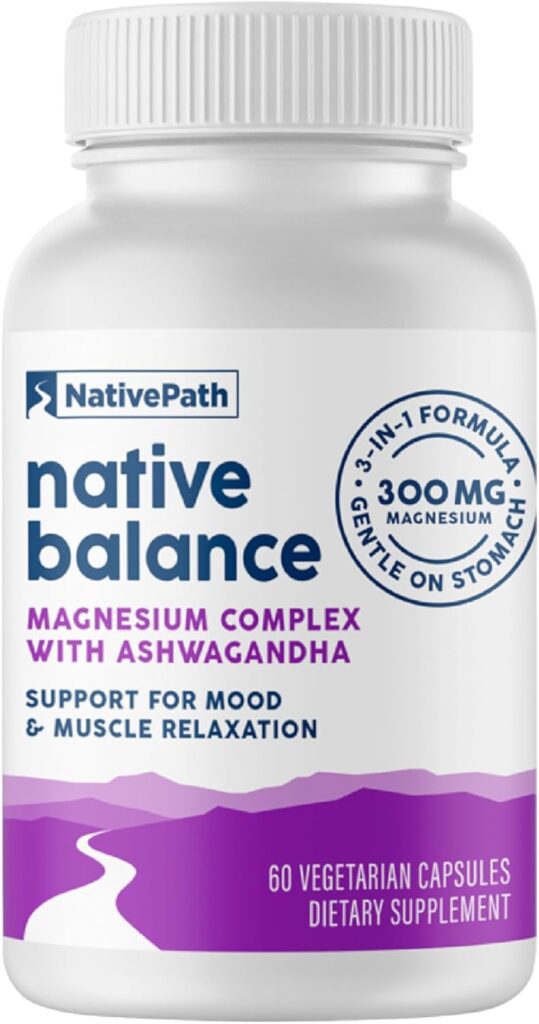Best Magnesium for Leg Cramps and Sleep: Find Relief and Sleep Better Tonight
Leg cramps at night can feel like your muscles are locking up out of nowhere—tight, painful, and impossible to ignore.
For many people, especially women going through hormonal changes, older adults, and those who stay physically active, these cramps are more than just an occasional annoyance—they’re a recurring issue that interferes with sleep and daily comfort.
Magnesium supplements are often one of the first things people turn to after trying hydration or stretching with little success. Known for supporting muscle function, nervous system balance, and sleep quality, magnesium has become the go-to option for natural relief from cramping and restless nights.
No time to read? Skip to Our Top Pick →

Disclosure: This article is reader-supported and contains affiliate links.
Why Magnesium Matters for Leg Cramps and Sleep
Magnesium supports muscle relaxation, nerve function, and the body’s ability to relax.
When levels are low, muscles may become more prone to cramping due to impaired relaxation and increased nerve excitability. This can lead to sudden tightness or spasms that interrupt your sleep and leave you feeling sore the next day.
Many adults don’t get enough magnesium through diet alone—especially those dealing with stress, hormonal shifts, or certain medications. That’s why supplementation is often recommended.
A well-absorbed, gentle form of magnesium is easier for your body to tolerate and incorporate into a daily routine.
Types of Magnesium for Leg Cramps and Better Sleep
Choosing the right form of magnesium makes a big difference. Some types absorb more easily, others are gentler on digestion, and a few are specifically known to support muscle relaxation and better sleep.
Here’s a quick breakdown to help you compare the most common forms:
| Type | Often Used For | Absorption | Notes |
|---|---|---|---|
| Magnesium Glycinate | Sleep & muscle relaxation | High | Gentle on stomach, calming effect |
| Magnesium Citrate | Replenishing magnesium levels | High | May cause loose stools at high doses |
| Magnesium Malate | Muscle pain, fatigue | Moderate | May support energy production |
| Magnesium Oxide | Secondary support, occasional constipation | Lower | Used in blends for its slow-release profile and high magnesium content. Not ideal as a standalone for cramps or sleep. |
| Magnesium L-Threonate | Sleep & cognitive support | Moderate–High | Crosses blood-brain barrier |
Based on the forms above, supplements that combine well-absorbed magnesium—particularly glycinate—with calming ingredients are often preferred for nighttime use. This approach may offer broader support for those dealing with both muscle cramping and disrupted sleep.
One formulation that reflects this balance is Native Balance Magnesium Complex. It includes magnesium glycinate, a small amount of slow-release magnesium oxide, and ashwagandha—an adaptogen commonly used to support stress-related sleep issues.
A Gentle Magnesium Blend for Nighttime Muscle and Sleep Support
Native Balance Magnesium Complex is formulated to support people dealing with leg cramps, sleep disruption, and stress-related muscle tension. It pairs highly absorbable magnesium glycinate with a smaller amount of magnesium oxide for extended support and includes ashwagandha to help calm the nervous system before bed.
What’s Inside:
- 200mg of magnesium glycinate to support muscle relaxation and restful sleep
- A small dose of magnesium oxide to help maintain magnesium levels throughout the night
- Ashwagandha extract, traditionally used to promote stress resilience and nighttime calm
- Designed to be easy on digestion and suitable for daily use
Best suited for:
Women navigating hormonal changes, older adults with nighttime muscle tension, or anyone experiencing cramps that interfere with sleep.
Prefer a Topical Option? Try Ancient Minerals Magnesium Lotion Ultra w/ MSM
Not everyone wants to take capsules—or can tolerate them. If you’re looking for a way to target leg cramps directly without taking a supplement, a topical magnesium lotion like Ancient Minerals may be the better option.
Key Benefits:
- Topical application delivers magnesium where you need it—no pills required
- Bypasses digestion, ideal for those with sensitive stomachs
- MSM for absorption and added muscle support
- Fast, targeted relief for nighttime cramps or post-activity soreness
Best suited for: Anyone who prefers not to take capsules, has gut sensitivities, or wants a targeted way to apply magnesium before bed.
Magnesium Dosage and Timing for Leg Cramps and Sleep
When to Take Magnesium
For sleep support and nighttime cramping, magnesium is typically taken in the evening, around 1–2 hours before bed. This timing allows the body to begin absorbing it as you wind down, supporting muscle relaxation and promoting a calm nervous system before sleep.
If you’re taking magnesium for general wellness or during the day for muscle tension, it can also be split into morning and evening doses, depending on tolerance and the specific product instructions.
How Much Magnesium Should You Take for Leg Cramps?
Most sleep and cramp-focused magnesium supplements provide 200–400 mg of elemental magnesium per day, which generally falls within safe intake guidelines for healthy adults.
- Magnesium glycinate is often well-tolerated and calming
- Magnesium citrate and oxide may cause digestive side effects at higher doses
- Always follow the specific dosage instructions on the product label
Most people find the best results by following these general guidelines:
- Adults typically need between 310-420mg of magnesium daily from all sources
- Start with a lower dose to see how your body responds, then increase gradually
- Take your magnesium supplement in the evening for best sleep benefits
- For easing leg cramps, consistency matters more than timing
- Follow product recommendations (Native Balance suggests two capsules daily)
Always talk to your healthcare provider before starting any new supplement, especially if you have kidney issues or take medications that might interact with magnesium.
Capsule vs Topical: What’s the Difference?
- Capsules/Tablets: These deliver magnesium through the digestive system. They’re better for full-body support but may cause digestive upset in some people.
- Topical Magnesium (lotions or sprays): Applied directly to the skin—often the legs or feet. These are useful for those with sensitive stomachs or those who prefer targeted support in a specific area.
Some people use both forms together (oral + topical), though it’s always a good idea to introduce one at a time and see how your body responds.
Magnesium Side Effects and Safety
Common Side Effects
Most people tolerate magnesium well, especially forms like glycinate and malate. That said, some individuals may experience:
- Mild digestive upset (nausea or loose stools)
- Skin irritation (in rare cases) from topical products
To reduce the chance of side effects, start with a lower dose and increase slowly if needed.
Who Should Speak With a Healthcare Provider?
It’s important to talk with your doctor before starting magnesium if you:
- Have kidney disease
- Are taking medications that affect magnesium absorption (e.g., diuretics, antibiotics)
- Are pregnant or breastfeeding, unless approved by your provider
- Have a history of electrolyte imbalances or GI disorders
Conclusion: How Magnesium Helps with Leg Cramps and Better Sleep
If leg cramps, restless legs, or poor sleep are regular issues for you, magnesium supplementation could be a simple, natural way to support your body—especially when taken in forms that are well absorbed and easy on digestion.
Native Balance Magnesium Complex offers a more comprehensive approach, combining two forms of magnesium with ashwagandha to help ease both physical muscle tension and mental restlessness. For people whose symptoms are tied to stress, hormonal changes, or overactive nerves, this kind of formula may offer broader support than single-ingredient supplements.
Prefer to keep things simple? Topical magnesium lotions are another option, especially for those who want to apply relief directly to problem areas like calves or feet.
Remember, magnesium supplementation is just one approach among many—individual results vary, and it’s always wise to consult with a healthcare provider about what might work best for your specific situation.
If you’re still comparing types, check out our breakdowns of magnesium glycinate vs. citrate and liposomal magnesium vs. magnesium glycinate. And if you prefer topical options, our guide to magnesium creams for sleep and anxiety is a great place to start.
Frequently Asked Questions About Magnesium for Leg Cramps
Which magnesium is best for sleep and leg cramps?
Native Balance Magnesium Complex is, in our opinion, a top contender among magnesium supplements for both sleep and leg cramps. It combines magnesium glycinate for quick absorption and magnesium oxide for lasting effects, along with ashwagandha to help reduce stress that can interfere with restful sleep.
Which is better for leg cramps, magnesium citrate or magnesium glycinate?
Magnesium glycinate is generally better for leg cramps than magnesium citrate for most people. Glycinate is more easily absorbed, gentler on the stomach, and the glycine component provides additional calming benefits. However, magnesium citrate works faster in some individuals and may be more effective specifically for restless leg syndrome. If digestive sensitivity is a concern, glycinate is the safer choice.
What vitamin stops leg cramps at night?
Magnesium is the primary mineral that helps stop leg cramps at night, though it’s technically a mineral rather than a vitamin. For comprehensive relief, a combination of magnesium with vitamin D, vitamin B6, and potassium can be particularly helpful. These nutrients work together to support proper muscle function, nerve signaling, and electrolyte balance, all of which can help with nighttime cramping.
How much magnesium glycinate per day for leg cramps?
For most adults, a typical dose of 200 to 400 mg of elemental magnesium per day from magnesium glycinate is considered appropriate for addressing muscle cramps, including leg cramps. That said, the ideal dose can vary based on factors like age, diet, stress levels, and how deficient you are in magnesium. Always follow the dosage instructions on the supplement label and consult your healthcare provider before beginning regular use—especially if you’re on medication or have underlying health conditions.
Is it safe to take magnesium every day?
For most people, taking magnesium daily is safe when following recommended dosages. However, those with kidney problems or certain medical conditions should ask a doctor first.
How long does it take for magnesium to work for leg cramps?
How long it takes to see improvements on leg cramps from taking magnesium varies. Some people report improvements within a few days, while others may take a few weeks to notice significant effects.
Can magnesium deficiency cause leg cramps?
Yes, magnesium deficiency is a common cause of leg cramps, especially nighttime cramps.
Are there any side effects of taking magnesium supplements?
Common side effects can include digestive issues like diarrhea, especially with higher doses or certain forms of magnesium.
Is magnesium oil effective for leg cramps?
Many users find magnesium oil effective for leg cramps when applied directly to the affected area.
Can I get enough magnesium from my diet alone?
While it’s possible to get magnesium from foods, many people don’t get enough through diet alone and may benefit from supplementation.
Does magnesium interact with any medications?
Magnesium can interact with certain medications, including antibiotics and diuretics. Always ask with a healthcare provider before starting magnesium supplements if you’re on medication.
Related Reading
- The Best Magnesium Glycinate for Sleep
- Best Magnesium Supplements for Sleep
- Liposomal Magnesium vs Magnesium Glycinate
- Magnesium L-Threonate vs Glycinate
- Best Magnesium Creams for Sleep and Anxiety
- Best Liposomal Magnesium for Sleep
Health Disclaimer: The information in this article is for educational purposes only and is not intended to replace professional medical advice, diagnosis, or treatment. Always seek the guidance of your physician or other qualified health provider with any questions regarding your health or medical condition.
Magnesium supplements may interact with certain medications or may not be suitable for people with specific medical conditions, particularly kidney disease. Pregnant or nursing women should consult their healthcare provider before starting any supplement. Individual results may vary.


